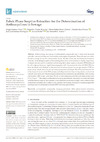Identificador persistente para citar o vincular este elemento:
https://accedacris.ulpgc.es/jspui/handle/10553/113970
| Título: | Fabric Phase Sorptive Extraction for the Determination of Anthracyclines in Sewage | Autores/as: | Santana Viera, Sergio Canino Byreing, Alejandro Torres Padrón, María Esther Sosa Ferrera, María Zoraida Santana Rodríguez, José Juan Kabir, Abuzar Furton, Kenneth G. |
Clasificación UNESCO: | 330201 Tecnología de los antibióticos 330810 Tecnología de aguas residuales 332817 Extracción liquido-liquido |
Palabras clave: | Antineoplastic compounds Emerging pollutants Fabric phase sorptive extraction Microextraction techniques Ultra-high performance liquid cromatography-fluorescense detector |
Fecha de publicación: | 2022 | Publicación seriada: | Separations | Resumen: | Anthracyclines are a group of antineoplastic compounds used to treat acute leukemia and other cancers, and they are excreted after consumption by patients. These chemicals are often found in sewage at very low concentration levels. For this reason, the development of sensitive analytical methodologies capable of determining them at low concentrations is of prime importance. A simple, fast and sensitive analytical method using fabric phase sorptive extraction (FPSE) followed by ultra-high performance liquid chromatography with fluorescence detection (UHPLC-FD) has been developed and validated for the extraction of anthracyclines from sewage samples. FPSE is a green, cheap, simple, selective and rapid sample preparation technique. The different parameters that affect the performance of the FPSE process, including extraction time, eluting solvent, elution time and pH, were optimized. The developed method showed satisfactory reproducibility, with intraday and interday RSD values lower than 15% for all the compounds and limits of detection between 0.1–0.15 µg·L−1. The unique combination of sample preparation by this micro-extraction technique with fluorescence detector have resulted in the satisfactory extraction of highly polar anthracyclines, without any noticeable matrix effect, a very common shortcoming of exhaustive sample preparation technique such as solid phase extraction (SPE) and mass spectrometry. | URI: | https://accedacris.ulpgc.es/handle/10553/113970 | ISSN: | 2297-8739 | DOI: | 10.3390/separations9030069 | Fuente: | Separations [EISSN 2297-8739], v. 9 (3), 69, (Marzo 2022) |
| Colección: | Artículos |
Citas SCOPUSTM
3
actualizado el 08-jun-2025
Citas de WEB OF SCIENCETM
Citations
1
actualizado el 25-ene-2026
Visitas
67
actualizado el 10-ene-2026
Descargas
21
actualizado el 10-ene-2026
Google ScholarTM
Verifica
Altmetric
Comparte
Exporta metadatos
Los elementos en ULPGC accedaCRIS están protegidos por derechos de autor con todos los derechos reservados, a menos que se indique lo contrario.
